Super Mario 3D All-Stars is a nostalgic trip down memory lane for many. It’s also a convenient way to experience three Nintendo classics for the very first time, which, for me, is the case when it comes to the first two games in the collection. I never owned a Nintendo 64, and Super Mario Sunshine never made its way onto my GameCube.
With that said, the 3D All-Stars collection is certainly a time machine in more ways than one. It’s easy to see why so many players fell in love with these games years ago, even when experiencing them as a first-time player in 2020.
The collection’s games do end up feeling dated in some areas thanks to the lack of major modern updates, but those flaws don’t do much to diminish their original magic.
Super Mario 3D All-Stars Review: Star-Studded Selections
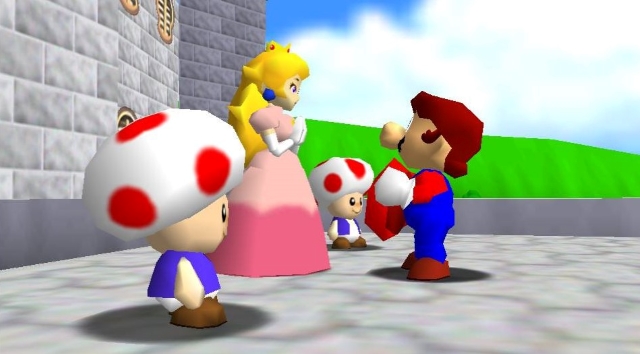
[If] you’re experiencing this for the first time, playing through this old-school Super Mario classic will still fill you with nostalgia.
Super Mario 64 launched in 1996. As someone who was too young to even hold a controller back then, I expected SM64 to be a somewhat trying experience to start. Thankfully, that wasn’t the case here — at least not for the majority of the game. If your situation is similar to mine, and you’re experiencing this for the first time, playing through this old-school Super Mario classic will still fill you with nostalgia.
The main goal in Super Mario 64 is to, unsurprisingly, save Princess Peach from Bowser after he’s taken control of Peach’s castle. In other words, it’s as standard as a Super Mario plot gets.
Ignoring the near nonexistent story, Mario’s 3D debut still holds up as a platformer. It’s full of memorable levels, creative puzzles, and secrets that are a joy to find.
Most of the game’s levels take full advantage of the 3D space with some truly timeless platforming. Bob-omb Battlefield, Hazy Maze Cave, and Big Boo’s Haunt are some of the standouts in that regard, with Big Boo’s being fun from the start, since you actually find the level first.
Super Mario 64 really shows its age, though, specifically in its visuals and archaic camera controls. The graphics are about as updated as they can be without going into full remake territory, so while the jagged edges and blurry textures aren’t exactly major issues, they are noticeable.
The camera controls, however, are rough. It always manages to get snagged on an invisible wall when you’re trying to rotate it around, making certain segments of the game feel impossible to get through.
It doesn’t help that it’s inverted in some situations, while it’s not in others. And there’s no setting to change camera preferences at all, making an update or addition here a welcome one.
While Super Mario 64 may feel a bit outdated as a result, its shortcomings are nowhere near as bothersome as those found in Super Mario Sunshine.
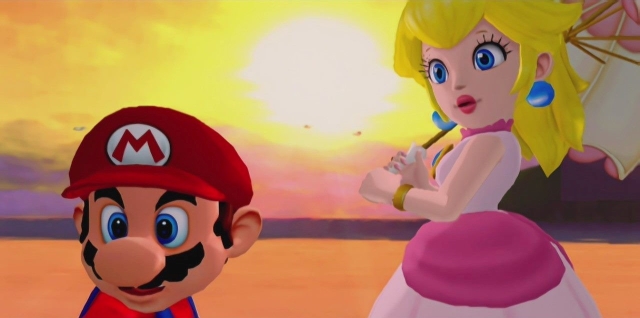
Somehow, Sunshine feels like it has more downsides than Super Mario 64, despite launching six years after that game in 2002. And you can thank FLUDD for most of it.
Here, Mario is framed for drawing graffiti all over Isle Delfino, and now he has to clean it up. It immediately feels like a plot point from Sonic Adventure 2 involving Sonic and Shadow.
This time around, you’ll have to use the water-filled backpack, FLUDD, for pretty much everything, from attacking to platforming. It’s a machine that blasts water to spray enemies, clean the environment, and improve Mario’s mobility.
It’s a creative idea that starts out interestingly enough. It has four different nozzles that shake up the gameplay in four very different ways. The Hover Nozzle is easily the most useful of the choices, as it allows players to find their own unique ways through many of the game’s levels with some outside-the-box thinking.
Sadly, FLUDD overstays its welcome due to its occasionally clunky controls. The few levels without FLUDD are tougher, but they make Sunshine feel like a greatly enhanced version of the platforming you’re used to from Super Mario 64.
3D All-Stars does its best to fix FLUDD’s mechanical awkwardness by providing a more simplified control scheme and adjusting the button layout. The “R” button allows for more precise, stationary aiming, and “ZR” allows Mario to spray water while on the move.
This all sounds great in concept, but in practice, FLUDD’s novelty wears off around halfway through the game; the exact moment that it lost me was during the Eely-Mouth boss fight in Noki Bay. FLUDD’s accuracy and controls are put to the test in a tricky underwater situation, and they fail miserably.
If you end up feeling like this about any of Sunshine‘s other stages, it might upset you to know that, unlike in Super Mario 64, you can’t just skip the ones you’re having trouble with. They must be done in order.
On the upside, 3D All-Stars upscales Sunshine‘s visuals by a noticeable amount. Isle Delfino’s sunny locales all look colorful and vibrant on the Switch, though they don’t look better than the numerous planets found in Super Mario Galaxy.
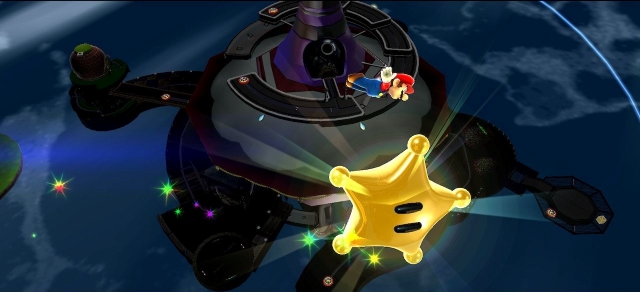
Galaxy checks every Super Mario box there is, from tight platforming to creative mechanics and a catchy soundtrack.
Super Mario Galaxy is still a great game, and without a doubt, the best one in this collection.
It really ups Bowser’s ambition and execution from a plot perspective. He still performs the regular old Princess Peach abduction, but this time, he brings her all the way to outer-space. You’ll be chasing after her with the help of Rosalina and the star-like Lumas.
Like Super Mario 64, this game does so many innovative things in all the right ways. Galaxy plays with gravity and perspective wonderfully, while adhering to the Super Mario school of top-notch platforming and puzzle-solving.
With that said, the camera can also be a nuisance here, working against you when smaller planets force annoying angle changes. But once again, it’s forgivable because it rarely has a prolonged negative impact on the gameplay mechanics.
Speaking of the mechanics, they’re solid for each of the control schemes, although the Joy-Cons do the best job of replicating that original feel of the Wii. It plays the same but doesn’t look the same thanks to some slight visual upgrades.
Galaxy checks every Super Mario box there is, from tight platforming to creative mechanics and a catchy soundtrack. Above all, it introduced some sort of an actual checkpoint system. Mario is no longer ejected from a level after every lost life. Thank goodness.
Super Mario 3D All-Stars Review — The Bottom Line
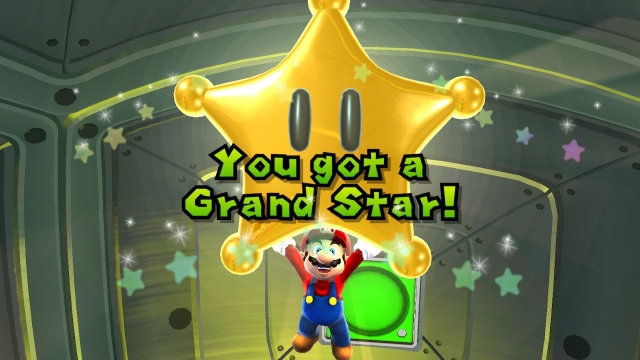
Pros
- Best way to play three classic Super Mario games
- Visual upgrades for the whole collection
- Galaxy is a standout, with the Joy-Cons replicating the Wiimote perfectly
Cons
- The modern updates are basically all visual, with very few quality-of-life changes
- Super Mario 64 is in need of a camera control upgrade
- Sunshine’s FLUDD controls occasionally lack precision and accuracy, even with the changes
Super Mario 3D All-Stars is a satisfying gift for the series’ 35th anniversary. The collection provides a worthwhile journey through Mario’s 3D beginnings, even for newcomers like myself.
Much more effort could’ve been put into modernizing the camera controls in Super Mario 64 and FLUDD’s spray mechanics in Super Mario Sunshine, but 3D All-Stars is still an overall enjoyable platformer package nonetheless.
[Note: Nintendo provided the copy of Super Mario 3D All-Stars used for this review.]

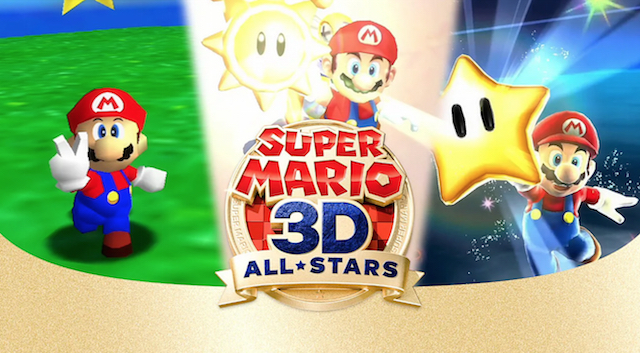





Published: Sep 24, 2020 12:59 am